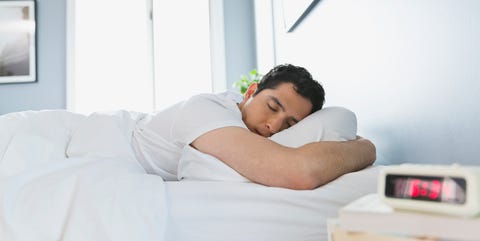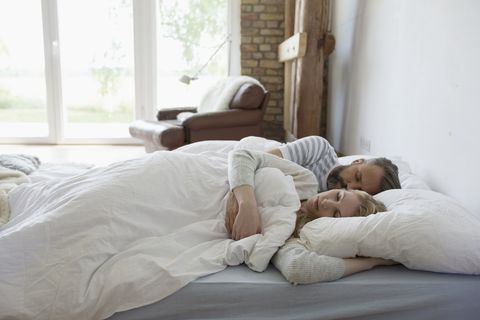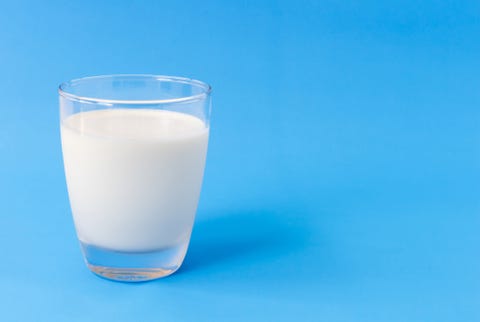
When it comes to sleep, everyone has their own ideas on how to get a good night’s rest. Some people swear by drinking a glass of milk, while others say you should never eat cheese before bed time.
How can you parse out fact from fiction? We delved into seven common sleep myths, and now we’re here to tell you why they’re flat-out wrong.
Hero Images
Reality: The amount of sleep someone needs depends on variety of factors, including genetics.
“Sleep need is like height, we are all different and how much we need is to a large degree, genetically determined,” sleep expert Dr. Neil Stanley explained to The Independent. Tracking your bed time, how many hours you sleep a night, and how well rested you feel each day can help you find the ideal amount of sleep for your body, according to sleep experts at Harvard.
Pongsak Tawansaeng / EyeEm
Reality: Drinking milk to go to sleep is such a popular theory, it’s been featured everywhere from dairy commercials to Happy Gilmore.
However, there’s no scientific evidence that drinking milk will help you sleep, according to the University of Arkansas. As the university explains in a blog post, the myth began because milk has small traces of tryptophan, an amino acid used to make the hormones serotonin and melatonin in our bodies, which do help us sleep. However, there’s not nearly enough tryptophan in milk to make anyone drowsy.
istetiana
Reality: Although people often blame cheese for their bad dreams, nutritionist Joy Dubost, R.D. previously told MensHealth.com there is no evidence to support this idea.
Researchers believe people who are sensitive to lactose may have trouble sleeping if they consume dairy before bed due to gas, bloating, or cramps — but not due to nightmares.
Westend61
Reality: Some believe napping is bad for bed time, but a quick afternoon rest won’t disrupt your ability to go to bed, according to the National Sleep Foundation. In fact, our internal clocks are programmed to make us sleepy in the afternoon. A short 20-minute nap is best so you don’t enter a REM, or a deeper stage of sleep, as this will only make you tired later in the day.
Siraphol Siricharattakul / EyeEm
Reality: According to The Better Sleep Council, surveys have shown that roughly 122 million American adults think it’s illegal to remove mattress tags. But the truth is, you can snip those pesky tags without fear of jail time.
LiveScience explains the tags were created a warning for store owners. In the early 1900s, the government believed companies were using old, discarded mattresses to stuff into “new” ones, so they started requiring manufacturers to list the materials.
Maskot
Reality: It’s entirely possible to sleep for eight or nine hours a night and still feel fatigued if you suffer from sleep apnea. People with the condition stop breathing while they sleep, which causes them to repeatedly wake up throughout the night. This makes it hard to sleep deeply, which causes daytime sleepiness.
PeopleImages
Reality: According to the Better Sleep Council, a whopping 122 million Americans believe that some people don’t dream. Ever. But researchers say that everybody dreams each night. In fact, the average person will dream four to six times per night when they enter REM sleep, according to the National Sleep Foundation.
People who think they don’t dream simply don’t remember, and scientists aren’t sure why some are able to recall their dreams better than others.
Source: Read Full Article






